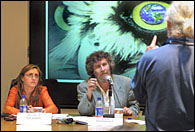Keeping an eye on the Earth
It will soon be ten years since leaders of the world made a commitment to environmental sustainability at the Rio Earth Summit. In August, leaders will gather in Johannesburg, South Africa, at the World Summit on Sustainable Development (WSSD) also known as Rio + 10, to try to agree on an implementation strategy.
 Moderators Angela Rickman and Jean Dussault
Moderators Angela Rickman and Jean DussaultPHOTO: Owen Egan |
|
The "Eye on the Earth Summit" was held at McGill last Tuesday, to assess how much has changed in ten years. The conference was organized by the McGill School of Environment in conjunction with Alternatives, a local non-governmental organization (NGO).
The motley group of panelists represented some of the key players in the discussions on Canada's stance at Rio + 10. Representatives from the Quebec and Canadian governments, an environmentalist from the NGO community, a member of the First Nations and a McGill professor brought different perspectives.
Speaking on behalf of the First Nations, Daniel Brant, chief executive officer of the Assembly of First Nations, discussed the need to include indigenous peoples in talks on the environment. "First Nations peoples generally have a closer relationship with the land," he said, explaining they have suffered the most profound effects of environmental degradation. He attributed the rise of illnesses and high suicide rates among First Nations people to the loss of traditional medicine, knowledge and places of worship. As for Canada's stance at Johannesburg, he stated, "We would like to see our philosophies reflected."
Angela Rickman, deputy director of the Sierra Club of Canada, a national environmental advocacy organization, lamented Canada's poor environmental record. "Canada's trade agenda has affected our domestic ability to protect the environment," she said, referring to NAFTA's infamous chapter 11 that allows multinational corporations to sue the Canadian government when government policies counter trade interests. "Trade cannot trump the environment," she declared.
From the Canadian government's perspective, Richard Ballhorn, director general of the international environmental affairs bureau of the Department of Foreign Affairs and International Trade (DFAIT), spoke of the need to look at sustainable development as a whole rather than simply focusing on the environment. Issues such as good governance should also figure in the discussions according to Ballhorn.
As for Quebec's involvement, Jacques Prescott, head of the sustainable services team of the ecological heritage department of the Quebec Ministry of the Environment, stated that there would be a focus on the preservation of cultural diversity when dealing with globalization.
Perhaps the most radical voice was that of Peter Brown, a geography professor and founding director of McGill's School of Environment. According to Brown, the entire discourse of sustainable development is inherently problematic. "Scrap the current idea of development," he proposed. "There are much more promising ideas than GNP growth." Brown suggested that the focus be removed from economic growth and placed on indicators such as literacy and numeracy, which he claimed were "much clearer objectives than economic growth."
Brown also took issue with the notion of sustainability, which he claimed was "impossible to define." According to Brown the panel he was sitting on was a clear indication that the idea of sustainability was just "a Christmas tree of desirable objectives." As to what should be sustained, Brown rejected the anthropocentric views of the world as a set of resources to exploit.
On the question of how much has changed, there was hardly any debate -- very little has changed over the past ten years. With Jean Chrétien chairing the G8 this year and Environment Minister David Anderson serving as president of the UN Environment Program's governing council (the body that oversees the WSSD process), it is clear that Canada has a leading role. The question is whether Canada has the political commitment to live up to it. As international development studies professor Désirée McGraw pointed out from the audience, Prime Minister Chrétien has not yet made a commitment to attend the WSSD.

